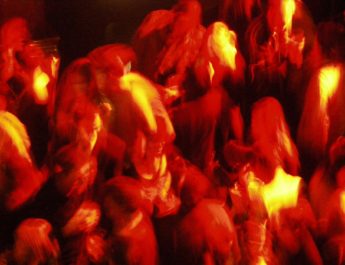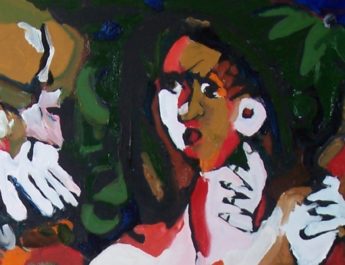Psalm 91:1-6, 14-16
Ordinary C44
1 You who liveA in the shelterB of the Most High,C
A “live” = yashab. This is to sit and so to remain and so to dwell. It is sitting for any reason – as a judge, in order to ambush, or just sitting quietly. Causatively, this can mean settling or marrying. This can also mean continue, endure, or establish.
B “shelter” = sether. From sathar (hide, conceal, or be absent; hiding because something is covered – used in a literal or figurative sense). This is covering, shelter, protection, hiding place. It can be hidden by a mountain, by clouds, in the womb, in a matter of secrecy, through slander, or of nations.
C “Most High” = Elyon. From alah (to go up, ascend, be high, be a priority; to arise in a literal or figurative sense). This is most high, upper. It refers to elevation – so, lofty.
who abideD in the shadowE of the Almighty,F
D “abide” = lun. This is to stop – usually to lodge for the night. It can imply dwelling, enduring, or staying permanently. Figuratively, it can mean being obstinate, particularly with one’s words – to complain.
E “shadow” = tsel. From tsalal (to be or become dark, shade; this is the shade as during twilight or shadow as associated with something opaque). This is shade in a literal or figurative sense. So, it could be shadow, shade, protection, shelter, or defense.
F “Almighty” = Shaddai. Perhaps from shadad (to ruin, assault, devastate, oppress, destroy completely; properly, it is being burly; figuratively it is something that is powerful) OR from shed (protective spirit) OR shadah (to moisten) OR shad (breast). Perhaps meaning almighty, “my destroyer,” “my protective spirit,” “my rainmaker,” “self-sufficient, “who is abundantly,” or “breasted one” – as the one who abundantly provides or grants fertility/abundance to humans. See https://www.abarim-publications.com/Meaning/Shaddai.html#.Xxi6Ep5KhPY
2 will say to the Lord,G “My refugeH and my fortress;I
my God,J in whom I trust.”K
G “Lord” = YHVH. From havah (to be, become) or hayah (to come to pass, become, be). This is the name of the God of Israel, the self-existent and eternal one, the tetragrammaton. This pronunciation has been lost to time so “Lord” is generally used in its place.
H “refuge” = machaseh. From chasah (to take refuge or flee for protection; figuratively, to hope or trust in someone or something). This is a shelter in a literal or figurative sense. It is refuge or place of refuge. It could also be hope or trust.
I “fortress” = matsud. From matsod (bulwark, siege works, net, snare); from tsud (to hunt, to lie in wait in order to catch an animal; used figuratively for capturing people). This is a castle, fortress, or stronghold. Also, a snare, net, or prey. It can abstractly mean capture.
J “God” = Elohim.
K “trust” = batach. This is to hide for refuge, be secure or sure. Figuratively, it refers to trust, being confident, or hoping.
3 For he will deliverL you from the snareM of the hunterN
and from the deadlyO pestilence;P
L “deliver” = natsal. This is to snatch someone or something away in a good sense – as rescue, defend, or deliver – or in a bad sense – as strip or plunder.
M “snare” = pach. From pachach (to trap, lay a net). This is a snare or bird trap. It can also refer to a sheet of metal hammered into a thin plate.
N “hunter” = yaqush. 3x in OT. From yaqosh (to set a snare in a literal or figurative sense; a fowler). This is entangled. It can be used for a fowler or trapper.
O “deadly” = havvah. Related to “Lord” in v2. 15x in OT. From havah (see note G above). This is a chasm, emptiness, or deep pit. It can be destruction or calamity. It can also be greed, craving, or mischief. It implies falling and ruin.
P “pestilence” = deber. From dabar (to speak, declare, discuss, destroy, subdue). This is plague or thorns.
4 he will coverQ you with his pinions,R
and underS his wingsT you will find refuge;U
Q “cover” = sakak. This is to cover or overshadow. It could also be to hedge or fence it. Figuratively, this could be to defend, protect, or join together.
R “pinions” = ebrah. 4x in OT. From eber (wing, pinion); from abar (to fly, soar). This is a feather or wing.
S “under” = tachat. This is underneath, below, the bottom, instead of.
T “wings” = kanaph. This is wing, edge, corner, extremity. It can also be a flap or fold of a garment or the pinnacle of a building.
U “find refuge” = chasah. Related to “refuge” in v2. See note H above.
his faithfulnessV is a shieldW and defense.X
V “faithfulness” = emet. From aman (to believe, endure, fulfill, confirm, support, be faithful, put one’s trust in, be steadfast. Figuratively, this is to be firm, steadfast, or faithful, trusting, believing, being permanent, morally solid). This is firmness or stability. Figuratively, it is faithfulness, truth, or trustworthiness. This is the same root that “amen” comes from.
W “shield” = tsinnah. From tsen (root may mean to be prickly; thorn, barb, cactus hedge). This is a hook or barb. It can also be a buckler, shield, target. Figuratively, it can refer to piercing cold.
X “defense” = socherah. 1x in OT. From sachar (to travel, go around; to travel like a peddler, to trade, to be a merchant, to palpitate.). This is a buckler or shield that surrounds someone.
5 You will not fearY the terrorZ of the nightAA
or the arrowBB that fliesCC by dayDD
Y “fear” = yare. This is to fear, be afraid, dreadful. It can also refer to fearful reverence – to fear in a moral sense is to say to revere, respect.
Z “terror” = pachad. From pachad (to dread, be afraid, thrill, be in awe; feeling startled from a sudden sound or alarm). This is dread, fear, awe, panic. It can also refer to what someone fears or dreads.
AA “night” = layil. Properly, this refers to light twisting away. It is used for night or midnight. Figuratively, this can mean adversity.
BB “arrow” = chets. From chatsats (to divide, chop, pierce, distribute, shoot an arrow, an archer). This is an arrow or archer, shaft, staff. Properly, it is someone or something that pierces, such as an arrow. It can imply a wound. Used figuratively of God’s thunder bolt.
CC “flies” = uph. This is to fly, flee, be weary. It can also mean to cloak with wings or darkness.
DD “by day” = yomam. From yom (day, age, daily, each, today). Root may mean to be hot. So, this is day as the hours that are hot. This can be daytime in a literal or figurative sense.
6 or the pestilence that stalksEE in darknessFF
or the destructionGG that wastesHH at noonday.II
EE “stalks” = halak. This is go, come, walk. It is walk literally and figuratively and includes people and animals. It can be used figuratively for one’s moral life – how we walk according to God’s way or against it. It can also refer to the walk of life as in the course one’s life takes, the choices we make, etc.
FF “darkness” = ophel. 9x in OT. Perhaps from the same as aphel (gloomy – unused root which refers to the sun setting i.e. dusky, dark). This is darkness, gloom, dusk, obscurity.
GG “destruction” = qeteb. 3x in OT. May come from a word that means to cut off. This is sting, pestilence, ruin, or destruction.
HH “wastes” = shud. Related to “Almighty” in v1. 1x in OT. Perhaps related to shadad (see note F above). This is to swell up, devastate.
II “noonday” = tsohar. From tsahar (pressing oil, glistening); from yitshar (fresh oil, anointed; oil as that which is burned to make light; used figuratively to talk about anointing). This is a light, window, or midday.
14 Those who loveJJ me, I will deliver;KK
I will protectLL those who knowMM my name.NN
JJ “love” = chashaq. 11x in OT. This is to cling, have a desire, love, join, deliver.
KK “deliver” = palat. This is to escape, slip out, deliver, carry away, or calve.
LL “protect” = sagab. This is to raise, lifted, high, set secure on high, excellent, or strong. It is inaccessibly high in a literal and figurative sense. It implies something that is safe and, therefore, something that is strong.
MM “know” = yada. This is to know, acknowledge, advise, answer, be aware, be acquainted with. Properly, this is to figure something out by seeing. It includes ideas of observation, recognition, and care about something. It can be used causatively for instruction, designation, and punishment.
NN “name” = shem. May be from sum (to put, place, set). This is name, fame, renown. A name was thought to indicate something essential about a person – something about their individuality. So, this word can also mean honor, authority, or character.
15 When they callOO to me, I will answerPP them;
I will be with them in trouble;QQ
I will rescueRR them and honorSS them.
OO “call” = qara. This is to call or call out – to call someone by name. Also used more broadly for calling forth.
PP “answer” = anah. This is answer, respond, announce, sing, shout, or testify. It means to pay attention, which implies responding and, by extension, starting to talk. Used in a specific sense for singing, shouting, testifying, etc.
QQ “trouble” = tsarah. From tsar (properly, a narrow or constricted place; figuratively, trouble, a pebble, an enemy, anguish, or distress); from tsarar (to bind, restrict, narrow, be cramped, an adversary). This is tightness, distress, affliction, trouble, or adversary.
RR “rescue” = chalats. This is to turn back or away in a literal or figurative sense. So, it could be return, break, build, retreat. It doesn’t necessarily imply going back to the place you started.
SS “honor” = kabad. To be heavy, weighty, or severe. It can also be positive abounding in, rich, or honorable. The Hebrew word for “glory,” kabod, is taken from this root.
16 With long lifeTT I will satisfyUU them
and showVV them my salvation.WW
TT “long life” = orek + yom. Literally, “length of days.” Orek is from arak (to be long in a literal or figurative sense, to continue, defer, draw out). This is length, long, or forever. Yom is related to “by day” in v5. See note DD above.
UU “satisfy” = saba. To be satisfied or full in a literal or figurative sense. Also, to have plenty of.
VV “show” = raah. This is to see in a literal or figurative sense so stare, advise, think, view.
WW “salvation” = yeshuah. From yasha (to deliver, defend, help, preserve, rescue, be safe. Properly, to be open, wide or free, which implies being safe. Used causatively, it means to free). This is salvation, deliverance, health, victory, prosperity.
Image credit: “Workshop: Caves with Tal Israel” at Bet Guvrin, Israel by Flavio~, 2013.




